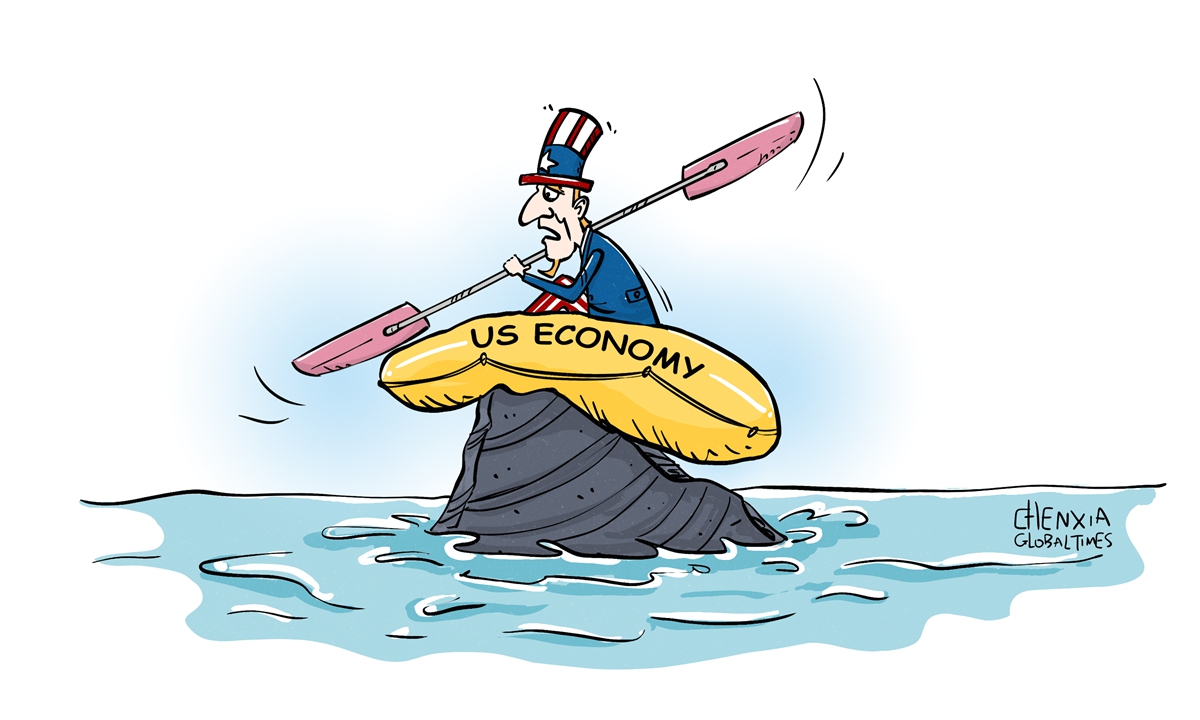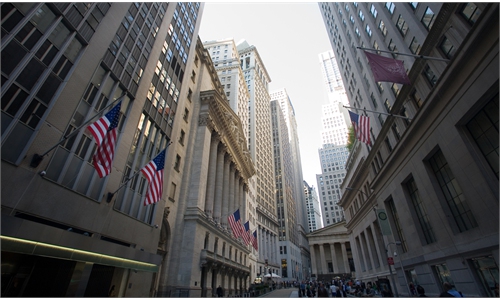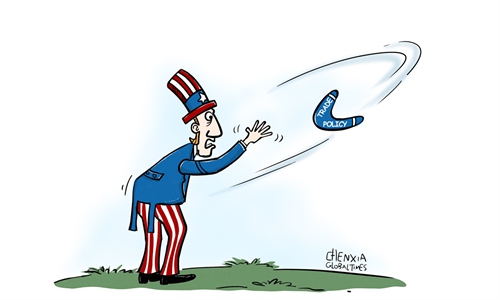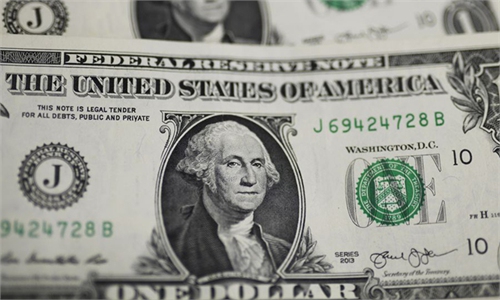
Illustration: Chen Xia/Global Times
The US government's credit rating was downgraded by Fitch Ratings last week in a dramatic move that reflected market concerns over the state of the country's finances and the ever-growing federal debt burden. A credit rating cut influences the interest rates the US pays on its debt, which will affect rates on bank loans on homes, cars and nearly everything.
To make things worse, the rating agency seemed to have lost confidence in the US' muddled political stalemate that stymies governance.
Fitch, one of the three major independent agencies that assess governments' creditworthiness, cut the US debt rating from the highest AAA to AA+, citing the country's "steady deterioration in standards of governance." The one-notch reduction in the benchmark rating reverberated through the capital market, with major US and European stock market indexes trending significantly down last week.
In June, after a drawn-out fierce political battle with Congressional Republicans, the Biden administration avoided a federal default. The repeated US political standoffs on debt limits and last-minute resolutions have eroded market trust in the country's fiscal management. Investors worldwide are becoming increasingly nervous about the expansion of the US national debt, which is entering uncharted territory.
The last time that the US federal debt was downgraded by a major credit rating agency was in 2011 by S&P, which had tremendous market impacts, causing steep stock market declines and rising bond yields. If the 2011 rating reduction acts as a mirror, US and global markets could encounter an unknown era of rising volatility.
By all metrics, Fitch is right in pointing out the biggest predicament facing the US is the steady erosion of governance. The US presidents from both political parties only took half-measures in bringing down the swollen federal debt, which stands at more than $32 trillion and is rising each passing day.
It's unknown whether Fitch's downgrading will be followed by S&P and Moody's in the coming weeks. But the country's continuous fiscal deterioration, coupled with the Democrat and Republican leaders' brinkmanship over raising the federal debt limit, is an ominous sign for the country's fiscal viability, as the debt burden worsens.
In its note, Fitch forecast that the US economy will slip into a recession in the final quarter of 2023 due to tighter credit conditions, weakening business investment and a slowdown in consumption. However, the mainstream US media opinion is that the country will escape recession, despite the Federal Reserve's decision to aggressively raise interest rates in order to tamp down inflation. Biden administration officials immediately objected to the rating downgrade by Fitch.
Treasury Secretary Janet Yellen issued a statement saying she "strongly disagree with Fitch Ratings' decision," and the rating change announced by Fitch is "arbitrary and based on outdated data." White House Press Secretary Karine Jean-Pierre tried to shift the administration's displeasure to Republicans, saying: "It's clear that extremism by Republican officials, from cheerleading default, to undermining governance and democracy, to seeking to extend deficit-busting tax giveaways for the wealthy, is a continued threat to our economy."
The US system of governance is notoriously inefficient and increasingly chaotic, signified by the unrelenting and ruthless bickering and jockeying between Democrats and Republicans.
The two major political parties are constantly engaged in partisan fights, and they spend most of their time at each other's throats whenever they debate and legislate on spending, taxation of rich people and corporations, medical care and social welfare for the poor, and other important issues. They are also confrontational in policymaking concerning education, abortion, same-sex marriage, immigration and more.
The US' self-trumpeted "democratic governance" has crumbled and broken down, as a spate of undemocratic and very primitive political dogfights are being put on before the world's eyes. Recently, a special counsel under the Justice Department indicted former President Donald Trump over charges "tied to his efforts to cling to power after losing the 2020 general election." Trump has been indicted in the states of New York and Florida on different charges, and he could face one more criminal charge in Georgia.
Adding to the political twist is that Trump is running for the 2024 presidential election and he is widely favored to stage a re-match with Joe Biden. No wonder Trump and his supporters are furious with Democrats, claiming that he is being "vilified and victimized" by Biden's Justice Department in order to reduce Trump's chances of getting re-elected.
The political drama in the US never ends, as the two major parties will continue their battles on political, economic, and societal and cultural issues, which defines the distressing inefficiency of US governance.
Investors use credit ratings as a benchmark for judging how risky it is to lend money to a government, and they will remain spooked by the political malaise in Washington. US debt has long been deemed "the safest of safe havens," but Fitch's rating downgrading last week suggests it has lost some of its luster, which will cause a cascade of US Treasury bond sell-offs. For example, all four of the largest holders of US debt reduced their holdings in May. The Chinese mainland's holdings fell for a third consecutive month to $846.7 billion, nearly a 13-year low, according to data released by the US Treasury Department. Japan, the largest holder, saw its holdings plunge more than $123 billion to reach $1.0968 trillion.
The author is an editor with the Global Times. bizopinion@globaltimes.com.cn



